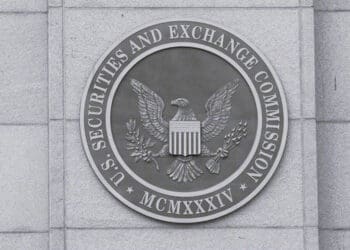A Look at SEC, FINRA and Other Issues
Cryptocurrency experienced massive and unprecedented growth in 2017, rising from a total market cap of $18.8 billion in January 2017 to $598.5 billion in December 2017. As of February 6, 2018, there were over 1,500 virtual currencies. The emergence of cryptocurrency has caused concern for regulators, who see rampant growth and speculation as a danger to unknowing investors.
with co-author Andrew Mount
Overview
Cryptocurrency is a digital, encrypted currency that is not issued by any government or other central authority. Theoretically, this independence allows cryptocurrency to grow naturally, free from regulation. The most popular cryptocurrency, Bitcoin, was created in 2009. Bitcoin is used to facilitate transactions securely and anonymously, without the usual involvement of financial institutions. Companies such as Overstock.com, Expedia, Dish Network and Microsoft accept Bitcoin as a payment option.
Bitcoin has a limited supply, as only 21 million will ever be created. Bitcoins are found by a process called “mining,” which is jargon for the discovery of new Bitcoins. Each time a Bitcoin transaction takes place, the transaction is stored in a “block” with a virtual padlock. A group of such transactions forms a blockchain. Miners use software running computer algorithms to solve complex math problems that “unlock” the blocks and verify the transactions. It takes almost 1.7 trillion attempts to find the key to unlock a box. When a box is unlocked, the miner gets a reward in the form of Bitcoins. As of February 26, 2018, it costs $4,758 in electricity to mine a single Bitcoin in the United States.[1] The process is similar with many alternative cryptocurrencies.
Cryptocurrency is readily available for purchase on online exchanges. Many cryptocurrency exchanges operate in a similar way to an online stock-trading platform. An individual can deposit “regular” currency and use that currency to buy cryptocurrency. On the most popular exchange, Coinbase, there are four cryptocurrencies that can be exchanged for “regular” currency: Bitcoin, Bitcoin Cash, Ethereum and Litecoin. The price of these coins fluctuates by the second and can experience wild swings in value over the course of a single day.
In 2017, Bitcoin and other cryptocurrencies surged in value. On September 15, 2017, it cost an average of $3,686 to buy one Bitcoin. On December 15, 2017, one Bitcoin was worth $17,601, and on January 15, 2018, one Bitcoin was worth $13,585.[2] Because of price volatility, main street investors are buying cryptocurrency as an investment with the goal of generating substantial profits in a later sale.
Regulatory Guidance
Congress has not yet regulated cryptocurrency. There is debate among regulators as to whether cryptocurrency is a security or a commodity. The Commodities Futures Trading Commission (“CFTC”) and Securities and Exchange Commission (“SEC”) are both interested in regulating the cryptocurrency market.
Commodities Futures Trading Commission
In mid-December 2017, Cboe Global Markets Inc. and CME Group Inc. used the CFTC’s self-certification process to offer futures contracts in Bitcoin. The CFTC required the firms to implement certain safeguards, including:
- An agreement to share information with the CFTC,
- Enhanced oversight measures and
- Heightened margin requirements.[3]
Despite these protections, CFTC Chairman J. Christopher Giancarlo warned investors that the cryptocurrency markets were largely unregulated and beyond the purview of the CFTC. Further, he stated, “investors should be aware of the potentially high level of volatility and risk in trading these contracts.”[4]
On January 19, 2018, CFTC Chairman Giancarlo spoke at the ABA Derivatives and Futures Conference in Naples, Florida and stated, “one thing is certain: ignoring virtual currency trading will not make it go away. Nor is it a responsible regulatory strategy. I also agree … that ‘instead of making value judgments about Bitcoin, what government should do is . . . take steps to help ensure that the Bitcoin price – wherever the market assigns it – is reflective of investors making informed decisions, free of fraud and manipulation.’”[5]
On March 6, 2018, U.S. District Senior Judge Jack B. Weinstein of the Eastern District of New York ruled that the CFTC had the authority, along with other agencies, to regulate cryptocurrency as a commodity.[6] The CFTC sued Cabbage Tech Corp., d/b/a Coin Drop Markets (“Coin Drop”) and its founder Patrick K. McDonnell, alleging that they were operating “a deceptive and fraudulent virtual currency scheme … for purported virtual currency trading advice” and “for virtual currency purchases and trading.” Customers paid Coin Drop for membership in trading groups and transferred funds for day trading to McDonnell and his team. Coin Drop did not end up providing trading advice and misappropriated the funds.
The Court held that cryptocurrencies fall within the Commodity Exchange Act (“CEA”) definition of a commodity as “’all other goods and articles … in which contracts for future delivery are presently or in the future dealt in.’” This gave the CFTC authority to bring suit against entities for “utilizing a scheme to defraud investors through a ‘contract for sale of a commodity in interstate commerce.’” The Court held that the CFTC’s authority did not preclude other agencies from regulating cryptocurrency.
Securities and Exchange Commission
In December 2017, SEC Chairman Jay Clayton issued a “Statement on Cryptocurrencies and Initial Coin Offerings.” In a section titled “Considerations for Market Professionals,” Chairman Clayton stated, “simply calling something a ‘currency’ or a currency-based product does not mean that it is not a security.” He stated that a promotor must either:
(1) be able to demonstrate that the currency or product is not a security or
(2) comply with applicable registration and other requirements under our securities laws.
Further, in facilitating cryptocurrency transactions, broker-dealers must comply with anti-money laundering and know your customer obligations.[7]
Several companies have attempted to launch exchange-traded funds (“ETFs”) that hold cryptocurrencies. The SEC, in a January 18, 2018, Staff Letter titled “Engaging on Fund Innovation and Cryptocurrency-related Holdings,” discussed investor protection issues surrounding the offering of cryptocurrency ETFs. The SEC highlighted two major issues with cryptocurrency ETFs: proper valuation and lack of liquidity. The SEC questioned whether firms would have the necessary data available to value cryptocurrencies given the lack of regulation, infantile state of trading and volatility in the market. Further, the SEC was concerned that the lack of regulation of cryptocurrency markets could lead to manipulation in the pricing of the assets.
The SEC was also concerned about a lack of liquidity. SEC Rule 22e-4 requires ETFs to maintain a liquidity risk management program in which only 15 percent of the assets in an ETF can be illiquid. The SEC questioned how ETFs would classify particular cryptocurrencies, given the volatility in the markets.[8]
Recently, the SEC has taken more aggressive action in regulating cryptocurrency. On March 7, 2018, the SEC released a public statement titled “Statement on Potentially Unlawful Online Platforms for Trading Digital Assets.” In this statement, the SEC stated, “if a platform offers trading of digital assets that are securities and operates as an ‘exchange,’ as defined by the federal securities laws, then the platform must register with the SEC as a national securities exchange or be exempt from registration.” The SEC went on to warn, “many online trading platforms appear to investors as SEC-registered and regulated marketplaces when they are not. Many platforms refer to themselves as ‘exchanges,’ which can give the misimpression to investors that they are regulated or meet the regulatory standards of a national securities exchange.”[9] The SEC is concerned that investors will be deceived into thinking they will receive the market protections they receive on registered exchanges when they are buying cryptocurrency on unregistered exchanges.
FINRA
The Financial Industry Regulatory Authority (“FINRA”) is a self-regulatory organization charged with regulating dealings between brokers, dealers and public investors. In 2015, FINRA issued an Investor Highlight titled “What You Should Know About Bitcoin.” The Highlight provided background information on Bitcoin and warned investors that Bitcoin is a “speculative investment” that is “extremely risky.”[10] It further warned investors to be wary of Bitcoin speculation and Bitcoin-related scams.
FINRA issues a yearly Regulatory and Examination Priorities Letter highlighting important issues the regulator will be focusing on in the coming year. In its 2018 Regulatory Priorities Letter, FINRA stated,
FINRA will closely monitor developments in . . . the role firms and registered representatives may plan in effecting transactions in [cryptocurrencies]. FINRA may review the mechanisms – for example, supervisory, compliance and operational infrastructure – firms have put in place to ensure compliance with relevant federal securities laws and regulations and FINRA rules.[11]
Despite various warnings to investors, FINRA has not released any formal guidance to brokerage firms.
New York Department of Financial Services
The New York Department of Financial Services (“NYDFS”) is responsible for regulating financial services and products in New York. NYDFS has granted virtual currency licenses to six companies. In February 2015, NYDFS released guidance to firms in the cryptocurrency space. It cautioned firms to implement measures designed to “effectively detect, prevent and respond to fraud, attempted fraud and similar wrongdoing.”[12] Specifically, NYDFS directed firms to implement policies which: (1) identify possible fraud or market manipulation, (2) allocate responsibility for monitoring risks and (3) provide for the effective investigation of possible fraud. Firms were directed to immediately report any wrongdoing discovered to NYDFS. Action Taken by Securities Firms
With the lack of SEC, CFTC and FINRA guidance, brokerage firms have been left on their own to regulate the activities of their brokers with regard to cryptocurrency. Although the SEC has not registered any cryptocurrency ETFs, an over-the-counter and unregistered product – Bitcoin Investment Trust – is available for main street investors. The major wire house brokerage firms have barred their financial advisors from buying Bitcoin Investment Trust and other Bitcoin-related investments for their clients. In doing so, one of the firms cited concerns with the suitability of the product. Further, only three major firms offer customers access to Bitcoin futures offered by CME Group and Cboe World Markets.
Conclusion
The rapid growth in popularity and price of cryptocurrency in 2017 and early 2018 has sparked regulators such as the SEC, CFTC and FINRA to consider how they can better protect investors. It is likely that cryptocurrency companies, cryptocurrency exchanges and brokerage firms that offer the sale of cryptocurrencies to customers will soon be subject to enhanced regulation and oversight.
[1] https://www.marketwatch.com/story/heres-how-much-it-costs-to-mine-a-single-bitcoin-in-your-country-2018-03-06.
[2] https://www.coindesk.com/price/.
[3] https://www.cftc.gov/PressRoom/PressReleases/pr7654-17.
[4] Id.
[5] https://www.cftc.gov/PressRoom/SpeechesTestimony/opagiancarlo34.
[6] CFTC v. McDonnell, No. 18-CV-361, 2018 U.S. Dist. LEXIS 36854 (E.D.N.Y. Mar. 6, 2018).
[7] https://www.sec.gov/news/public-statement/statement-clayton-2017-12-11.
[8] https://www.sec.gov/divisions/investment/noaction/2018/cryptocurrency-011818.htm.
[9] https://www.sec.gov/news/public-statement/enforcement-tm-statement-potentially-unlawful-online-platforms-trading.
[10] http://www.finra.org/investors/highlights/what-you-should-know-about-bitcoin.
[11] http://www.finra.org/industry/2018-regulatory-and-examination-priorities-letter.
[12] https://www.dfs.ny.gov/about/press/pr1802071.htm
 Andrew T. Mount is an Associate in Bressler Amery Ross’ Securities Litigation and Real Estate practice groups. An alumnus of the Bressler, Amery & Ross, P.C. summer associate program, Andrew joined the firm upon receiving his J.D. from Villanova University School of Law.
Andrew T. Mount is an Associate in Bressler Amery Ross’ Securities Litigation and Real Estate practice groups. An alumnus of the Bressler, Amery & Ross, P.C. summer associate program, Andrew joined the firm upon receiving his J.D. from Villanova University School of Law.
Andrew is a member of Bressler’s Senior Issues: Counseling and Litigation Defense group. The lawyers in this group have a shared interest in providing counsel to corporate clients who confront issues affecting seniors.
While at Villanova Law, Andrew was a member of the Health Law Clinic, where he assisted low-income clients in understanding and asserting their rights within the health care system. Also during law school, Andrew interned with the U.S. District Court for the Eastern District of Pennsylvania, in the chambers of the Honorable Berle M. Schiller.
Andrew received his B.A. in Political Science from Loyola University Maryland. During college, he interned with the Baltimore City State’s Attorney’s Office.



 Matthew C. Plant is Principal at Bressler Amery Ross. Matt focuses his practice on securities litigation and regulatory law. He has appeared on behalf of corporate and institutional clients in federal and state courts in New York and New Jersey, and at arbitrations before various self-regulatory organizations. He also represents individual registered representatives and corporate clients in connection with self-regulatory organizations and state investigations and inquiries.
Over the past years, Matt has personally witnessed product failures that have resulted in complex litigation for his clients. These failures have included hedge funds and structured products, among other examples. Matt is highly adept in guiding his clients beyond such obstacles and in overcoming financial product specific litigation claims.
Because Matt understands how financial products and services are structured and managed, his ability to work with witnesses involved in litigation claims is highly developed, and frequently a competitive edge for his clients. Often in partnership with in-house counsel, Matt has worked with his clients to ensure that such matters are handled in a consistent fashion and as efficiently as possible, never losing sight of achieving a positive result.
Matt is also a member of Bressler’s
Matthew C. Plant is Principal at Bressler Amery Ross. Matt focuses his practice on securities litigation and regulatory law. He has appeared on behalf of corporate and institutional clients in federal and state courts in New York and New Jersey, and at arbitrations before various self-regulatory organizations. He also represents individual registered representatives and corporate clients in connection with self-regulatory organizations and state investigations and inquiries.
Over the past years, Matt has personally witnessed product failures that have resulted in complex litigation for his clients. These failures have included hedge funds and structured products, among other examples. Matt is highly adept in guiding his clients beyond such obstacles and in overcoming financial product specific litigation claims.
Because Matt understands how financial products and services are structured and managed, his ability to work with witnesses involved in litigation claims is highly developed, and frequently a competitive edge for his clients. Often in partnership with in-house counsel, Matt has worked with his clients to ensure that such matters are handled in a consistent fashion and as efficiently as possible, never losing sight of achieving a positive result.
Matt is also a member of Bressler’s 






